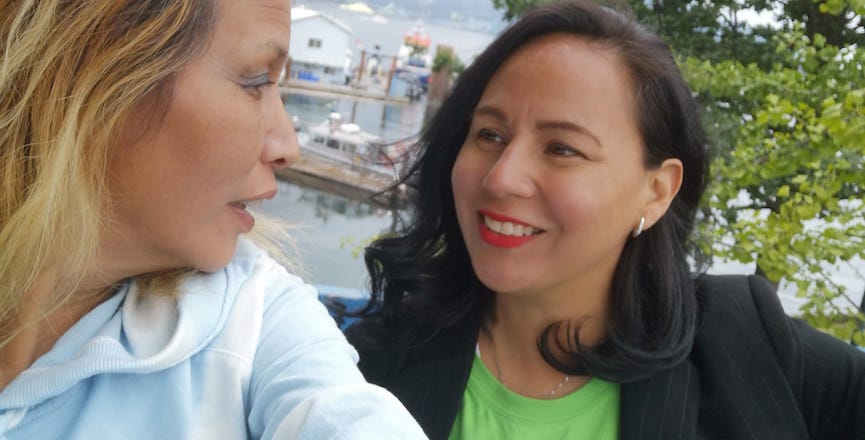The discovery of over 200 unmarked graves of Indigenous children at a former residential school in Kamloops, B.C. shook Dr. Cheryl Matthew to her core — her mother, aunts, uncles, and grandfather attended that school.
“I was retraumatized by this [discovery]” Matthew said. “I have three little girls myself and the thought of one of them or all of them, not being able to keep them, having them taken away from me and never coming home,” she added, breaks her heart.
Matthew, of the Simpcw First Nation, is running for the Green Party for the first time. She hopes to turn the Vancouver East riding — long held by the NDP — green.
Government inaction on reconciliation and Indigenous rights is just one reason why Matthew made the leap from working as a senior policy analyst for the federal government into federal politics.
Now, she’s hoping to follow the footsteps of her role models Elizabeth May and Green candidate Bridget Burns, who ran in Matthew’s riding in the last provincial election cycle.
The district of Vancouver East has elected NDP candidates in almost every election since 1961, with the NDP’s Jenny Kwan serving since 2015.
Matthew was disappointed by the lack of acknowledgement from federal parties on the genocide that’s happened and continues to happen to Indigenous women. Matthew said she would have gone further, calling it femicide in Canada and through North America.
“[We]’re targeted, and we are murdered, we go missing, we are sex trafficked,” Matthew said. “I mean, I live in a Canada where I have three daughters, and I’m afraid to go out and walk down the street at 11 o’clock at night.”
A single, working mom, Matthew also juggles volunteer commitments including with the Protect Our Indigenous Sisters Society and the Vancouver Aboriginal Community Policing Centre. She also worked on the National Inquiry into Missing and Murdered Indigenous Women and Girls.
Matthew panned the federal Liberals’ plan to implement the calls to action from the Truth and Reconciliation Commission, calling it lip service. She also noted that the Native Women’s Association of Canada, a leader in terms of Indigenous women’s representation in Canada, stepped away from the negotiation table with Justin Trudeau.
Housing affordability is also a priority for Matthew, who believes in the Land Back movement as a way to address historical inequities.
Matthew wasn’t always so politically engaged, until she felt the urgency, and the heat, of the worsening climate crisis plaguing western Canada with record-setting wildfires. Matthew lives near Lytton, where temperatures scorched to above 49 degrees Celsius, devastating the community with wildfires.
Matthew has spent 25 years in Vancouver, and said she’s never experienced temperatures like the heat dome that set records in British Columbia this summer.
Matthew was excited by Trudeau’s plan to tackle election reform in the 2015 campaign, but says she later became disillusioned with the party when it became clear first-past-the-post would remain in place for the foreseeable future. Matthew believes an electoral system like New Zealand’s, with mixed proportional representation, would serve as a more fair process for Canadian voters.
Political issues in B.C. like the Tiny House Warriors and the situation at Fairy Creek where premier John Horgan has allowed cutting of old growth forests became the tipping point for Matthew to run under the Green banner.
When she looked at the Green Party platform in 2019, Matthew said it was the first time an entire party platform actually spoke to her on a personal level. The legalization of opioids is only one piece of legislation that sets the Green Party apart for Matthew.
Matthew volunteered on a provincial scale, working on the campaign of Bridget Burns who ran for MLA in Vancouver-Hastings. She assumed Burns would run again federally. When Matthew found out that wouldn’t be the case, she jumped at the opportunity to add her name to the ballot.
In 2019, Matthew left her role in the federal government to go back to work with Indigenous nations. That’s where she’s learned the most about how the federal government has failed Indigenous peoples.
“They’re really concerned that one day soon, we’re not going to have any more salmon,” Matthew said. An elder told Matthew “one day, the only salmon that we’re going to see is in that clear box,” referring to a salmon discovery area.
That revelation shook Matthew, who realized she needed to take a stand and make meaningful change to combat the climate crisis. She’s often kept up at night wondering what could become of the country under a return to Conservative leadership.
“I’m a believer in open policy, and the ability for policy to inform Canadians,” Matthew said, adding, “we have to be the Elizabeth May’s of the world and we have to persevere.”
Stephen Wentzell is rabble.ca‘s national politics reporter, a cat-dad to Benson, and a Real Housewives fanatic. Based in Halifax, he writes solutions-based, people-centred stories.
Image: votercheryl/Facebook



